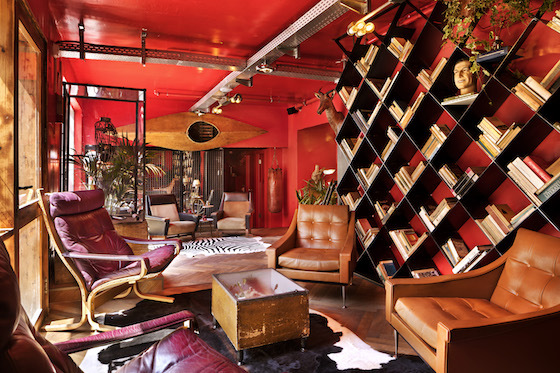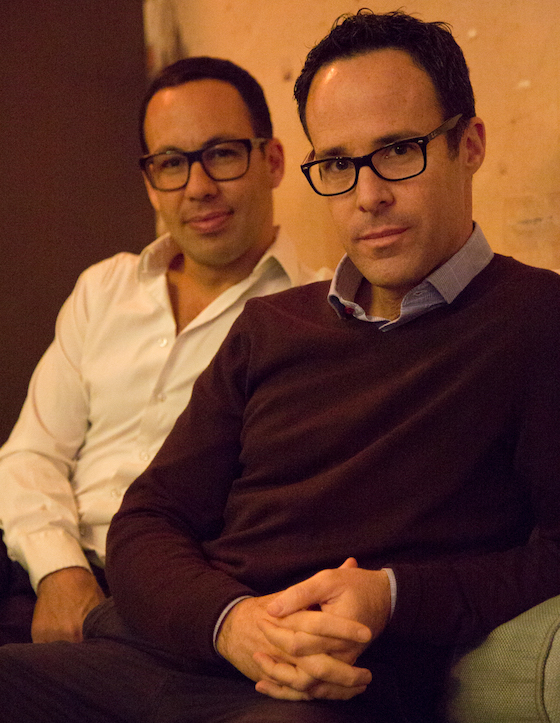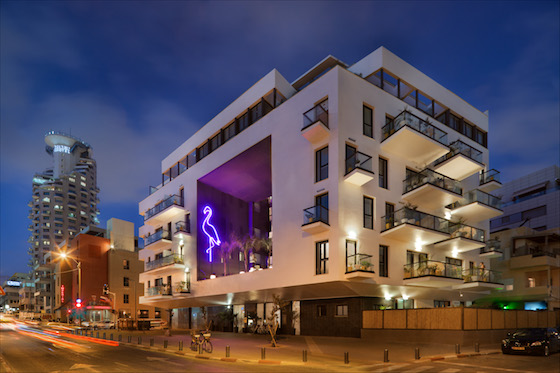Tel Aviv is hot. The economy is thriving and boutique hotels, a relatively new phenomenon compared to other destinations, have bourgeoned in just over a decade. Developer Leopard Hospitality’s Brown Hotels pioneered the trend and is quickly expanding with design-led properties in Israel and Croatia.
Contributed by Alicia Sheber
Leopard co-founders Leon Avigad and Nitzan Perry, life and business partners for the past 20 years, saw the enormous potential for boutique hotels in Tel Aviv’s creative culture. Avigad started his career as an 18-year-old globetrotter organizing entertainment for Club Med, then under the Dan Hotels group worked his way from bellhop at Jerusalem’s King David Hotel to being trained at the London Ritz and Badrutt Palace in St. Moritz, Switzerland. He left Dan for the opening of the Jerusalem Hilton, now the David Citadel, subsequently returning as the Dan Tel Aviv’s executive assistant GM. He launched Leopard consultancy at 32 years old, and four years later, in 2010, Tel Aviv’s first gay-friendly property, Brown TLV.

Avigad is both a hotelier and a developer, knowing how to create experiences and how things tick. “Creativity, design and sense of place produce unique, exciting hotels that drive revenue,” he said. “The spreadsheet will follow. Our philosophy is based on warmth, under an umbrella of kindness, hospitality, attention to detail and fun-loving bars.” That recipe has served rollouts in Tel Aviv of Brown Beach Hotel and the historic Poli House blending celebrated “White City” Bauhaus architecture with Karim Rashid’s avant-garde interiors.
In Jerusalem, Villa Brown and Villa Ba’moshava bring contemporary design into heritage buildings, while the Brown Beach House in Trogir, a medieval walled town on a small Croatian island, marks the brand’s first foray outside Israel. In 2019, Brown will achieve 1,000 rooms across 10 hotels, a contributing factor in its decision to no longer participate in affiliate programs.
“We realized membership was no longer necessary, because guest experiences promote Brown Hotels,” Avigad said. “We enter markets with strong propositions and a neighborly approach to community relationships, which makes locals happy to support us.”
Brown is a collection of hotels, not a chain, with concepts that differentiate in design and specific-yet-flexible service protocols. The dark, faded glam of the film “Barfly” inspired Brown TLV’s interiors and ambience, while team members are encouraged to personalize their fashionista-designed “uniforms” by, for example, showing off tattoos. From the way water jars are delivered each morning to guestrooms to telephone etiquette to the F&B approach – everything stems from each hotel’s guiding vision.

Avigad explains that people must “sense the place”: a friendly welcome in the lobby, a sit-down concierge, stylish design, a signature scent. “We want guests to feel part of the happiest hotel in that location, and by staying with us, they’ll know its lifestyle and scene,” he explained. “Our teams take pride in sharing their cool, contemporary worlds with those wanting to enjoy the best in the city. Authenticity and being real to their personal truths are essential: They don’t take commissions and only recommend places they find genuinely interesting.”
Nothing is outsourced. Avigad trains new staff, determines room blocking and is involved in marketing decisions. Business is robust and valued at hundreds of millions of shekels, according to the company, and backing by financial institutions will come into play as the group expands. The company manages all its hotels, and if the right opportunities arise, will purchase properties in conjunction with group investor and management partner Nir Waizman. Hospitality runs in the blood of the Waizman family, which shares a longtime friendship with Avigad. Brother Liran Wizman owns the Europe Hotels Private Collection, which includes brand Sir Hotels among others, as well the Grand City Hotels Group with over 120 properties.

According to Israeli hotel expert Joseph Fischer, owner of Vision Hospitality and Travel, it’s not just tourism driving demand. Business travel is rising in Tel Aviv with Apple recently opening a large R&D center, Booking.com opening one last year and Israel being the second most popular place for startups after Silicon Valley, with a high percentage located in the “Silicon Wadi” outskirts.
Tel Aviv is a young, 120-year-old city interconnected with one of the world’s oldest places, 3,500-year-old Jaffa, also a hotspot for new hotels. Opening mid-2018 are the 130-key Setai, a 13th-century Ottoman prison; The Drisco sees the original Jerusalem Hotel built by the Drisco brothers in 1866 restored to a 40-key boutique; and the 126-room Jaffa, a Luxury Collection Hotel, formerly housed a French monastery.
“Tel Aviv can be summed up in one word: vibe, Fischer said. “If New York is the ‘Big Apple’, Tel Aviv is the ‘Small Apple’. Everything happens here, it’s non-stop and the source of many new gastronomy and hospitality concepts. Recent legislation allows the streamlined conversion of offices to hotels, which opens possibilities for meeting Tel Aviv’s dire need for budget and limited service properties.”
Increased demand from a wider guest base has not escaped Brown Hotels. Avigad is reimagining budget hotels with Brown’s sub-brand, Dave, averaging US$125-US$150 per night. Dave West, Son of a Brown, opened in Tel Aviv this year as an alternative to AirBnB. Its eclectic style pairs a Bauhaus building with funky ‘70s flea market finds.
“The social economy is part of life, and apartment rentals can coincide with hotels so long as they’re regulated and taxed,” he explained. “Quality, inexpensive hotels are the future. With Dave, we’re not abandoning our aspiration to create and inspire – younger families on budgets can still stay at a designer hotel. Our guests are global nomads who work hard and play hard and enjoy Four Seasons as well as budget hotels.”
Fischer said Dave is just one brand in a very up-and-coming sector of a market predominantly controlled by Israelis. “Israelis move fast when a project becomes available and international groups are left in the dust,” he reveals. “This is due in part to their asset-light business models and all the brand diversification. By having boots on the ground, a joint venture or franchise partnership can immediately react to opportunities.”
Yet for all the optimism, challenges remain. Tel Aviv real estate is more expensive than Tokyo, especially along the coastline, so budget properties are opening inland. For Avigad, managing growth while maintaining an attentive, local and individual feel is a personal goal, and developing in a country with political uncertainty means including contingencies in business plans. However, on the whole, Tel Aviv is safe and guests don’t require assurance. Fischer agreed: “Terrorism is a global plague and Israel is actually gaining points as a destination due in part to its strong economic security – on average the GDP increases by 3.5% to 4.5% YOY, and the airports had a 50% growth rate in the last five years. Amongst Israel’s 8.5 million population, 4.6 million travel annually.”
Brown Hotels wants to accommodate those travelers as the brand expands in Tel Aviv with The Lighthouse, a luxury boutique opening in July; a second Dave, Dave South, opening in September; and in winter, a third Brown on the famed Rothschild Boulevard, not yet named. Two further hotels are planned for Tel Aviv and Jerusalem in 2019, and on Brown’s radar is expansion in the Mediterranean along with Zagreb and Belgrade in the Adriatic region, and perhaps someday, Miami Beach. “I’m enthusiastic about what’s to come,” said Avigad, “and seeing Brown Hotels’ new ‘babies’ spread love, happiness and cool vibes.”
